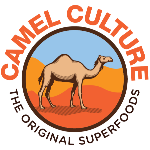Where Does Camel Milk Originally Come From?
For thousands of years, camel milk has been crucial to the diet of desert peoples.
From the Bedouins in the Arabian Peninsula to the Tuaregs in the Sahara, camels have played an essential role in sustaining life in some of the harshest environments on earth.
Despite its long history and cultural significance, camel milk is only now starting to gain recognition as a unique and nutritious food source beyond the desert.

The Importance of Camels (and their Milk)
The domestication of camels is thought to have occurred around 3,000 BCE in the Arabian Peninsula. Camels were originally used as beasts of burden, carrying goods and supplies across the desert.
However, their ability to produce milk and withstand extreme heat made them a valuable source of nutrition for nomadic populations.
In many cultures, camels were considered a symbol of wealth and prosperity, and their milk was reserved for special occasions or given as a gift to guests. Wealth is often measured by the size of their herd. As one nomad told us, "Camels are like our $100 bills, while sheep and goats are our small coins."
Over time, the use of camel milk spread across the Arab world and into Africa, where it became an important food source for nomadic communities in the Sahara and beyond.
Despite its long history, however, camel milk remained largely unknown outside of these regions until the late 20th century, when a growing interest in traditional foods and alternative forms of nutrition sparked renewed interest in this ancient drink.

The Health Benefits of Camel Milk
1. Similar Protein Structure to Human Breast Milk:
Camel milk is the closest animal dairy to human mother's milk!
Camels produce a healthy milk full of rare proteins which boost your body's natural immune system. Similar to an infant who relies on a natural immunity they receive from their mother's milk.
2. Non-Allergenic:
Many people today are suffering from food allergies -especially when it comes to cow milk. Cow milk allergy is the most common food allergy in babies and young children.
Camel milk lacks the 2 most common allergenic proteins found in cow milk -A1 casein and lactoglobulin, and it is usually tolerated by those with dairy allergies.
3. Rich in Vitamins and Nutrients:
Camel milk contains 10x more iron and 3x more vitamin C than cows milk. It's also higher than cows milk in calcium, potassium, and vitamin A, B, D, E.
All while being low in cholesterol and saturated fat -and high in healthy unsaturated fatty acids.

Camel Milk Hospitality & Tradition
In many cultures, camel milk is more than just sustenance – it is a symbol of hospitality.
In the Arabian Peninsula, for example, it is customary to offer guests a cup of camel milk as a sign of respect and generosity.
Similarly, in nomadic communities in Africa, camel milk is an important part of traditional wedding and naming ceremonies, and is often used as a form of currency in bartering and trade.

Camel Milk Today!
In recent years, the global demand for camel milk has grown as consumers seek out more sustainable and nutritious food options.
In countries like the United Arab Emirates, where camels have been an integral part of the cultural heritage for centuries, there has been a renewed interest in this ancient food source.
Modern dairy farms are now producing and exporting high-quality, pasteurized camel milk and dairy products to countries around the world.
In addition to its use as a food, camel milk is also being studied for its potential health benefits.
TL;DR
Camel milk has a rich and varied history that spans thousands of years and encompasses many different cultures and traditions.
Despite its long tradition and cultural significance, however, this ancient food source is only now starting to gain recognition as a unique and nutritious food source beyond the desert.
Whether enjoyed as a traditional drink, used as a food ingredient, or explored for its medical potential, camel milk is a fascinating and versatile food that has much to offer people around the world.
TRY CAMEL MILK FOR YOURSELF!
The only way to discover the power of camel milk is to give it a try!
If it can sustain others on a 1,000 mile journey through 120 degree heat -imagine how it can benefit you.
We offer a risk-free sample pack to get you over the hump and calm your nerves about drinking milk that does not come from a cow. 😂
It's time to ditch the latest superfood trends and get back to THE ORIGINAL SUPERFOOD -camel milk!
Trust the wisdom of our nomadic ancestors, who have proven over millennia that camel milk is the milk that gives life!



